Research transforms care for people with multiple sclerosis
Our researchers are leading the way to more effective, affordable, and equitable care.
Annette Langer-Gould, MD, PhD, studies treatments to improve care for people with MS. Jacques Roussel is a patient partner in one of her studies.
Treatment for multiple sclerosis needs to change. At Kaiser Permanente, it already has.
We’ve improved care thanks to research conducted by Annette Langer-Gould, MD, PhD, and her colleagues.
Dr. Langer-Gould wants the rest of the world to follow. She co-authored an article in the journal Neurology urging the medical community to adopt use of a medication that has the potential to improve care for many patients.
Dr. Langer-Gould, a neurologist and a scientist who studies MS, discusses what she’s learned through her research.
What is MS?
MS is a disease that affects the brain and spinal cord, often leading to permanent disability. It cannot be cured. But medications can help reduce the risk of disability.
Nearly a million people in the United States have MS. For most people, the disease starts with a rather sudden onset of symptoms. Those symptoms may go away or lessen with time. If new symptoms appear or old symptoms return for a period of time, it’s called a relapse.
Why does MS treatment need to change?
People with more aggressive MS benefit from stronger drugs. However, in the United States, many people can’t afford the copays. Sometimes people don’t get the treatment they need and become disabled.
At Kaiser Permanente in Southern California, our Multiple Sclerosis Treatment Optimization Program ensures that more people with relapsing MS receive highly effective drugs as early in the disease course as possible.
Key to the program is our increased use of a drug called rituximab. This drug is more traditionally used for cancer and other diseases. But evidence shows it’s safe and highly effective for relapsing MS. And it costs much less than other options.
Many insurance carriers in the United States and Europe limit coverage of rituximab for treating MS. They’ve cited a lack of regulatory approval for use of the drug to treat MS. But that may be changing.
The World Health Organization now lists rituximab as an essential drug for MS. I hope other organizations will follow. Wider use could have significant benefits for patients and could reduce inequities.
How has your research led you to push for a shift?
A study we published in 2022 found that MS relapse rates plummeted for Kaiser Permanente members in Southern California during the initial rollout of our program. Thanks in part to the lower cost of rituximab, the cost of treatment has fallen.
And patients say they love rituximab. Besides being effective and affordable, it’s long-lasting, so they don’t need to come to the office as often. That means more people tend to stick with treatment over time.
What’s more, research in Sweden showed similar benefits of rituximab for patients. The country’s health care system has now approved it for MS. It really seems to be a game changer.
What drew you to study MS?
I began seeing MS patients as a medical resident and PhD student. It’s a chronic disease, so it gave me an opportunity to build rewarding, long-term relationships with patients. I also realized studying MS would be a chance to fight for underserved patients.
Our success with MS highlights Kaiser Permanente’s use of evidence-based medicine. We’re improving care based on evidence gathered through our research. And we hope the rest of the country follows our lead.
-
Social Share
- Share Research Transforms Care for People With Multiple Sclerosis on Pinterest
- Share Research Transforms Care for People With Multiple Sclerosis on LinkedIn
- Share Research Transforms Care for People With Multiple Sclerosis on Twitter
- Share Research Transforms Care for People With Multiple Sclerosis on Facebook
- Print Research Transforms Care for People With Multiple Sclerosis
- Email Research Transforms Care for People With Multiple Sclerosis

March 25, 2025
AI in health care: 7 principles of responsible use
These guidelines ensure we use artificial intelligence tools that are safe …

February 26, 2025
Spring into a better night’s sleep
A Kaiser Permanente sleep expert shares tips for decreasing the impact …

February 20, 2025
Kaiser Permanente joins Food Is Medicine Colorado coalition
As an inaugural member, Kaiser Permanente will help lead health care’s …

November 26, 2024
Personalize your care with a family health history
Talk with your family members about their medical conditions. What you …

November 26, 2024
How to reduce your risk of stroke
A Kaiser Permanente doctor and researcher shares the simple changes you …

November 18, 2024
The power of early detection and proactive men’s health
A father's determination to stay healthy for his 3 children led him to …

October 1, 2024
Screening for breast cancer: Mammogram guidelines
A Kaiser Permanente radiologist answers commonly asked questions.

October 1, 2024
From depression to connection: Older adult finds her way
After a long period of loneliness and isolation, Roberta Maguire gets the …

September 19, 2024
First look at new Lakewood facilities
New medical offices will enhance the health care experience for members …

September 18, 2024
More than 100 ‘Top Docs’ recognized in Washington state
Kaiser Permanente celebrates doctors and nurse practitioners recognized …

July 10, 2024
Grant to help make school lunches healthier for kids
Chef Ann Foundation will use $275,000 grant for Colorado program to convert …

July 2, 2024
Reducing cultural barriers to food security
To reduce barriers, Food Bank of the Rockies’ Culturally Responsive Food …

June 28, 2024
Operation Splash makes a splash for safe summer fun
Kaiser Permanente is making waves this summer, ensuring that communities …

June 28, 2024
Health Action Summit highlights mental health opportunities
The Kaiser Permanente Colorado Health Action Summit gathered nonprofits, …

June 17, 2024
A culture of caring eases a cancer journey
Exceptional, personalized radiation oncology care helped Maura Craig treat …

June 3, 2024
A call to ‘Connect’ for cancer prevention research
Participate in a study to help uncover the causes of cancer and how to …
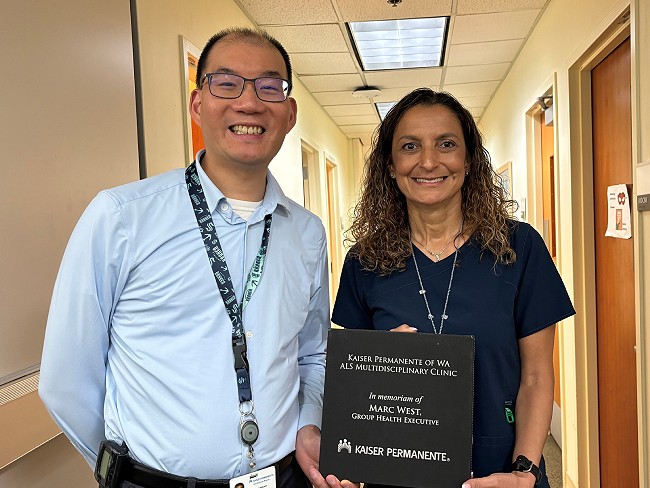
May 1, 2024
Tacoma ALS clinic recognized for high-quality care
Patients with amyotrophic lateral sclerosis, also called Lou Gehrig’s disease, …

April 23, 2024
We’re rising up to help prevent falls
Kaiser Permanente is committed to finding ways to help reduce falls in …

April 17, 2024
5 common health conditions men don’t like to talk about
Some of the most common conditions affecting men carry a social stigma …

April 9, 2024
Denver Fire Department annual blood work screenings triple
It’s easy to put off recommended health screenings, and sometimes even …

April 1, 2024
Lynch syndrome: Managing the risk of hereditary colon cancer
Lynch syndrome is a gene mutation that increases colon cancer risk. Learn …

March 19, 2024
Fostering responsible AI in health care
With the right policies and partnerships, artificial intelligence can lead …

March 14, 2024
Healthy kidneys support overall good health
Kaiser Permanente excels in preventing, detecting, and treating kidney …
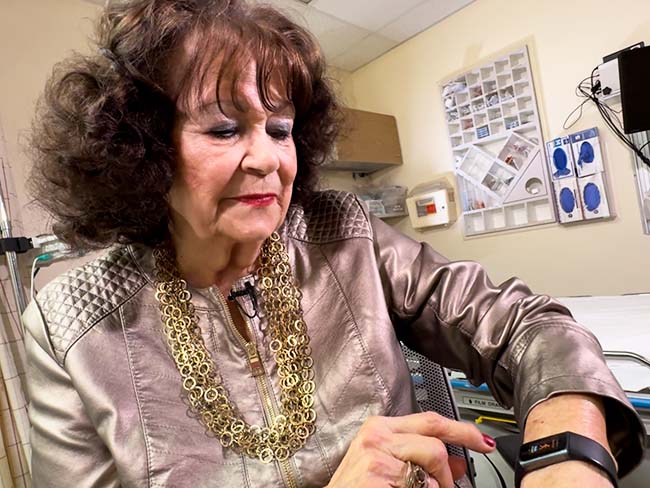
March 12, 2024
In-home recovery restores harmony to life
Colorado musician back with the band thanks to new virtual cardiac rehab …

March 6, 2024
Are you dreading the spring season?
A new Kaiser Permanente facility in Bellflower, California, makes customized …

February 21, 2024
From planning his funeral to celebrating his wedding
Gabriel Abarca had no hope for his future. Then the team at Kaiser Permanente …

January 31, 2024
Prioritizing policies for health and well-being in Colorado
CityHealth’s 2023 Annual Policy Assessment awards cities for their policies …

December 12, 2023
Hundreds attend first Food Is Medicine Summit
Attendees look at ways to get healthy food to people who don’t have enough …

December 6, 2023
Leading research with gratitude
Learn how you can participate in a study to uncover what causes cancer …

December 6, 2023
Leaders named among health care’s most influential
Greg A. Adams; Maria Ansari, MD, FACC; and Ramin Davidoff, MD, have been …

October 23, 2023
The future of health care is digital
Nari Gopala, Kaiser Permanente’s chief digital officer, answers 3 questions …

October 4, 2023
An easier way to manage multiple prescriptions
If you have an ongoing health condition, you know it can be tricky to keep …

September 27, 2023
10 school districts receive next round of RISE grants
The Thriving Schools program helps educators and students in Colorado integrate …

September 19, 2023
Is telehealth right for you?
Members give video visits high marks — and with a few simple tips, you …

September 13, 2023
Transforming the medical record
Kaiser Permanente’s adoption of disruptive technology in the 1970s sparked …

August 16, 2023
Cervical cancer screening: Exploring the at-home HPV test
Kaiser Permanente is at the forefront of cervical cancer research. Find …

August 15, 2023
As temperatures rise, so does the risk of heart problems
A Kaiser Permanente cardiologist shares advice on how to stay safe, what …

August 14, 2023
Tips for ensuring a safe and healthy college experience
Students should study up on their care options to ace their school experience. …

August 14, 2023
Marla’s story: Surviving acute promyelocytic leukemia
After a diagnosis for a rare type of blood cancer, Marla Marriott got high-quali …

August 4, 2023
Eating well and adopting healthy habits helps prevent cancer
Learn how lifestyle medicine is part of cancer care at Kaiser Permanente.

June 15, 2023
Stay safe while having fun in the sun
Tips for preventing sunburn and decreasing the risk of skin cancer.

June 14, 2023
5 easy ways to reduce heart disease risk
A reminder that men and women can assert control over risk factors that …

April 25, 2023
Hannah Peters, MD, provides essential care to ‘Rosies’
When thousands of women industrial workers, often called “Rosies,” joined …

April 14, 2023
The importance of screening for gestational diabetes
Gestational diabetes poses a significant risk to women of color, particularly …

April 7, 2023
Increasing access to health care
Kaiser Permanente launches new mobile health vehicle on Oahu.

March 14, 2023
Colorectal cancer on the rise among younger adults
Learn why early screening is crucial for prevention and treatment.

March 6, 2023
Living with long COVID
From avid snowboarder to chronically ill patient. How Kaiser Permanente …

February 27, 2023
Teaching flu a lesson
School-based flu vaccination clinics made it safe and convenient for students …

January 27, 2023
Timely flu vaccinations at community events
Proactive flu prevention outreach helped community members in Downey, California …

December 22, 2022
Denver earns an overall gold medal
CityHealth recognizes Denver for its leadership in supporting policies …
November 11, 2022
Our integrated care model
We’re different than other health plans, and that’s how we think health …

October 6, 2022
We’re a Fast Company Innovation by Design winner
Kaiser Permanente is the first health care organization to win Design Company …
October 1, 2022
Innovation and research
Learn about our rich legacy of scientific research that spurred revolutionary …

May 5, 2022
Research study will inform the future of cancer prevention
Connect for Cancer Prevention Study’s goal to recruit 200,000 participants …

September 10, 2021
‘Baby in the drawer’ helped turn the tide for breastfeeding
This innovation in rooming-in allowed newborns to stay close to mothers …

August 13, 2021
Remote patient monitoring improves care for chronic disease
If you have a chronic condition such as high blood pressure or diabetes, …

July 30, 2021
Pairing doctors with your devices for improved health
Wellness and fitness-tracking devices can help doctors and patients coordinate …

May 24, 2021
Supporting access to telehealth for vulnerable populations
Kaiser Permanente grants help fund community organizations working to expand …

February 22, 2021
The Permanente Richmond Field Hospital
Forlorn and all but forgotten, it played a proud role during the World …

February 4, 2021
A passion for the practice of cardiology
Dr. Chileshe Price shares her commitment to advancing cardiac care through …

January 15, 2021
The fastest path to care
Available 24/7 with no appointment, e-visits offer Kaiser Permanente members …

September 28, 2020
A legacy of disruptive innovation
Proceeds from a new book detailing the history of the Kaiser Foundation …

August 26, 2020
Kaiser Permanente’s pioneering nurse-midwives
The 1970s nurse-midwife movement transformed delivery practices.

July 21, 2020
Diagnostic and preventive care is in our DNA
A routine screening helped detect Bill Walsh’s cancer before it became …

July 1, 2020
A breakout moment for virtual care
Kaiser Permanente’s fully integrated telehealth capabilities place quality …

June 4, 2020
A role model for quality, innovation, and transformation
Nation’s health care leaders and clinicians in annual survey point to Kaiser …

February 20, 2020
Bringing healing home with virtual cardiac rehabilitation
Michelle Wofford gets a new lease on life after a serious cardiac event.

August 2, 2019
Thriving with 1960s-launched KFOG radio
Kaiser Broadcasting radio connected listeners, while TV stations brought …

February 5, 2019
Mobile clinics: 'Health on wheels'
Kaiser Permanente mobile health vehicles brought care to people, closing …

April 30, 2018
Nursing pioneers leads to a legacy of leadership
Kaiser Foundation School of Nursing students learned a new philosophy emphasizin …

April 19, 2018
Wasting nothing: Recycling then and now
Environmentalism was a common practice at the Kaiser shipyards long before …

April 12, 2018
Harold Hatch, health insurance visionary
The founding of Kaiser Permanente's concept of prepaid health care in the …
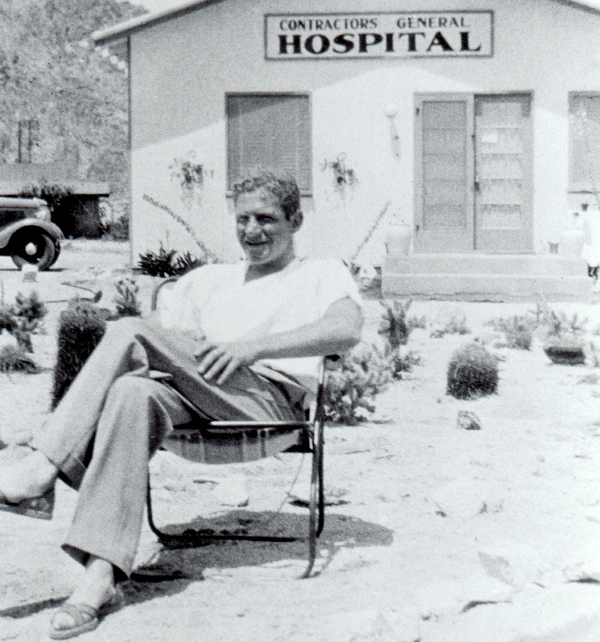
March 26, 2018
5 physicians who made a difference
Meet 5 outstanding doctors who advanced the practice of medical care with …

December 19, 2017
From boats to books: A history of Kaiser Permanente’s medical libraries
Kaiser Permanente librarians are vital in helping clinicians remain updated …

October 12, 2017
An experiment named Fabiola
Health care takes root in Oakland, California.

August 15, 2017
Sidney R. Garfield, MD, on medical care as a right
Hear Kaiser Permanente’s physician co-founder talk about what he learned …

August 10, 2017
‘Good medicine brought within reach of all'
Paul de Kruif, microbiologist and writer, provides early accounts of Kaiser …

July 14, 2017
Kaiser’s role in building an accessible transit system
Harold Willson, an employee, and an advocate for accessible transportation, …
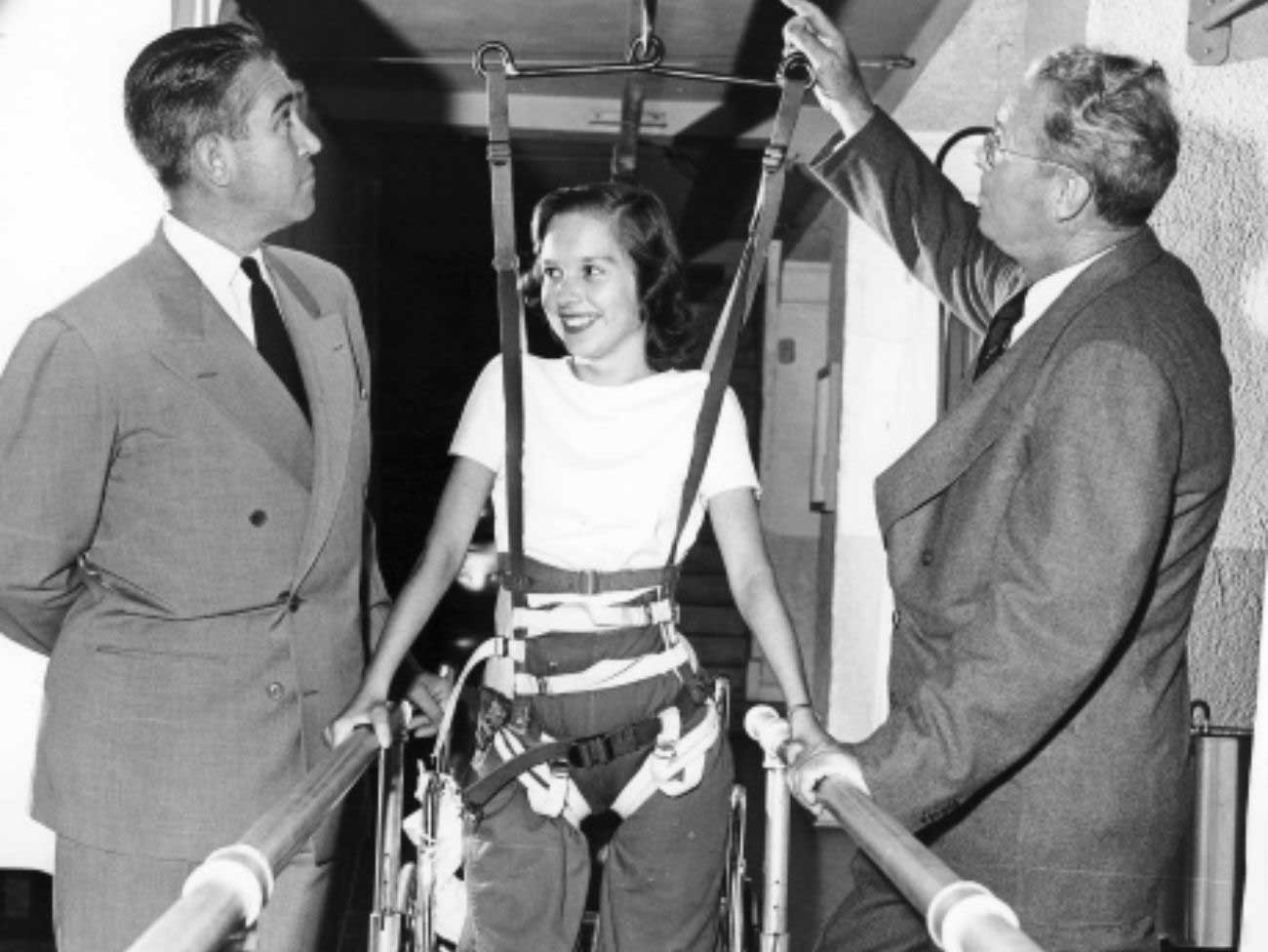
July 7, 2017
Mending bodies and minds — Kabat-Kaiser Vallejo
The expanded new location provided care to a greater population of members …

June 23, 2017
No getting round it: An innovative approach to building design
Kaiser Permanente incorporated innovative circular architectural designs …

June 14, 2017
Kabat-Kaiser: Improving quality of life through rehabilitation
When polio epidemics erupted, pioneering treatments by Dr. Herman Kabat …
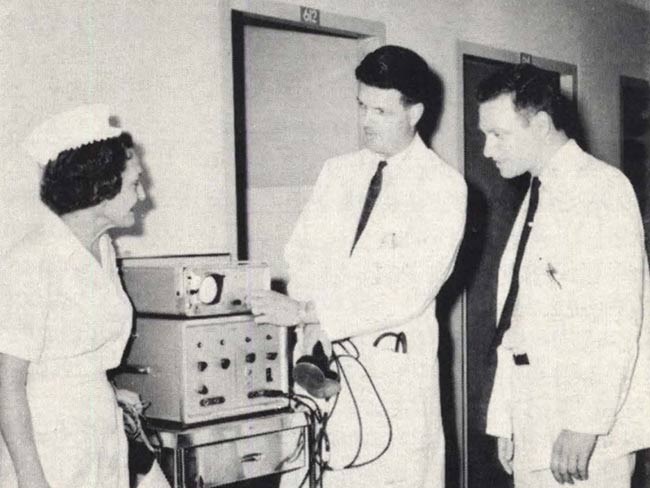
June 9, 2017
Edmund (Ted) Van Brunt, pioneer of electronic health records, dies at age …
Throughout his career, Dr. Van Brunt applied computers and databases in …

May 4, 2017
How a Kaiser Permanente nurse transformed health education
Kaiser Permanente's Health Education Research Center and Health Education …
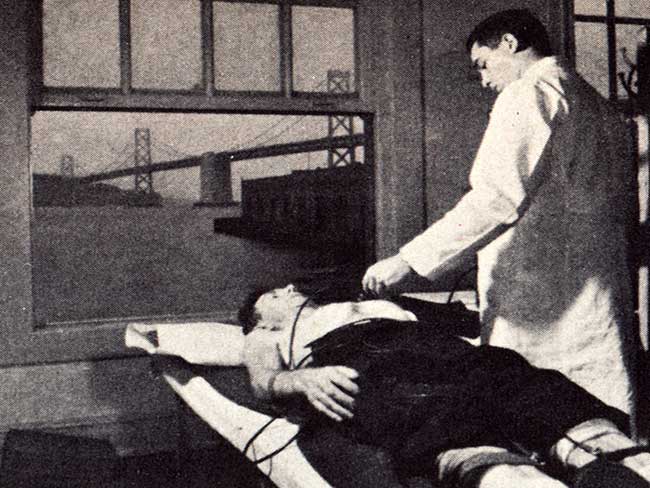
March 1, 2017
Screening for better health: Medical care as a right
When industrial workers joined the health plan, an integrated battery of …

February 17, 2017
Experiments in radial hospital design
The 1960s represented a bold step in medical office architecture around …

October 12, 2016
Kaiser’s geodesic dome clinic
There are hospital rounds, and there are round hospitals.

April 20, 2016
Henry J. Kaiser’s environmental stewardship
Since the 1940s, Kaiser Industries and Kaiser Permanente have a long history …

November 13, 2015
Dr. Morris Collen’s last book on medical informatics
The last published work of Morris F. Collen, MD, one of Kaiser Permanente’s …

October 29, 2015
From paper to pixels — the new paradigm of electronic medical records
Transitioning to electronic health records introduced new approaches, skills, …

September 23, 2015
Kaiser Permanente and NASA — taking telemedicine out of this world
Kaiser Permanente International designs, develop, and test a remote health …

July 22, 2015
Kaiser Permanente as a national model for care
Kaiser Permanente proposed a revolutionary national health care model after …

December 11, 2014
Henry J. Kaiser, geodesic dome pioneer

October 8, 2014
Breast cancer isn’t just a woman’s issue

July 23, 2014
Kaiser shipyards pioneered use of wonder drug penicillin
Though supplies for civilians were limited, Dr. Morris Collen’s wartime …

June 24, 2014
Kaiser Permanente's first hospital changes and grows
A collection of vintage photos that chronicle the evolution of Oakland …

September 23, 2013
Kaiser Permanente pioneered solar power in health facilities in 1980
Santa Clara Medical Center hosted a solar panel project in 1979 to demonstrate …

September 19, 2013
Kaiser’s postwar suburbs designed for pedestrian safety and fitness
Model neighborhoods close to jobs and laid out with meandering lanes and …

July 9, 2013
Kaiser Permanente Web presence rooted in past
The first Kaiser Permanente website launched in 1996, creating a new way …

March 6, 2013
Decades of health records fuel Kaiser Permanente research
Over 50 years of early Kaiser Permanente electronic health records since …

October 23, 2012
Disabled Kaiser Permanente employee changed course of public transportation
In the 1960s, Harold Willson successfully advocated for the historically …